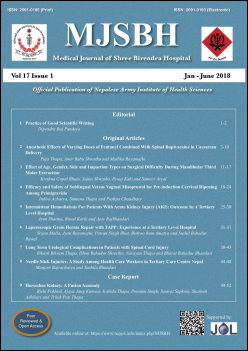Intermittent Hemodialysis For Patients With Acute Kidney Injury (AKI): Outcome In A Tertiary Level Hospital
Keywords:
Acute kidney injury, hemodialysis, outcomeAbstract
INTRODUCTION: Acute kidney injury (AKI) is the sudden loss of renal function with accumulation of nitrogenous waste compounds. In developing countries, community acquired AKI is common than AKI in hospitalized septic patients. With conservative management many patients recover renal function however few require renal support with intermittent Hemodialysis (HD). We conducted a study to find out the etiology and outcome of the patients presenting with AKI who required dialysis.
METHODS: This is a descriptive follow up study of the patients who needed renal replacement therapy in the form of HD presenting to our Nephrology unit of the hospital over a period of two years. Patients were followed up for three months post discharge. Data were tabulated and analyzed using SPSS software.
RESULTS: Total 50 patients were included in study with 67% male. The commonest etiologies were urinary tract infection (30%) and acute gastroenteritis (24%).The mean creatinine at the time of nephrology consultation, maximum level and at the time of discharge were 6.5(SD± 2.62), 7.3(SD ±2.13) and 2.2(SD ±1.75) respectively. Uremia with anuria was the most common reason for the initiation of HD in 54% cases. The mean number of intermittent HD used was 3.36. Complete recovery was seen in 68%, death in 26% and CKD in 6%.
CONCLUSION: UTI followed by acute gastroenteritis are the leading cause of AKI in our tertiary level hospital. Timely initiated renal replacement therapy in the form of intermittent HD could lead to substantial renal recovery in almost three fourth of patients.
Downloads
Downloads
Published
How to Cite
Issue
Section
License
This license enables reusers to distribute, remix, adapt, and build upon the material in any medium or format for noncommercial purposes only, and only so long as attribution is given to the creator.




